
Mendive. Revista de Educación, july-september 2019; 17(3): 373-392
Translated from the original in Spanish
Management process of the university-business relationship at the Technical University «Luis Vargas Torres»
Proceso de gestión de la relación universidad-empresa en la Universidad Técnica «Luis Vargas Torres»
Lisbet Martínez Gil1, Romina Tanagra Oyarvide Ibarra2, Félix Segundo Rosales Cortés2, Mercedes Magdalena Bustos Gámez2
1Technical University «Luis Vargas Torres». Faculty of Education
Sciences. Ecuador. ORCID: https://orcid.org/0000-0001-6428-5971, E-mail: gil.martinez@utelvt.edu.ec
2 Technical University «Luis Vargas Torres». Faculty of Administrative and
Economic Sciences. Ecuador.
Received: May 13th, 2019.
Approved: June 18th, 2019.
ABSTRACT
The University-Enterprise relationship must be managed in universities, so that it can effectively contribute to the quality of professionals, the relevance of research and, in general, and the impact of the institution on the development of its environment. When perceiving some limitations of this management in the Faculty of Administrative and Economic Sciences (FACAE in Spanish), of the Technical University «Luis Vargas Torres», of the province Esmeraldas in Ecuador; a research was initiated that would allow to base a process of management of the relationship in this academic structure, to systematize and direct the actions in integration with the university substantive processes. By means of the bibliographic analysis and the survey to the professors and directors of this faculty, the theoretical and empirical elements necessary for the proposal and the regularities of the current management in this faculty are determined. In the article the foundations of the process for the management of the University-Enterprise relationship in this faculty are presented by means of principles that govern its operation; its inputs and outputs from a systemic approach, and the stages to follow; that allow the dynamism and strengthening of the interactions between both actors of local and national development.
Keywords: management; university-enterprise relationship; university relevance; local development
RESUMEN
La relación Universidad-Empresa debe ser gestionada en las universidades, de manera que pueda contribuir efectivamente a la calidad de la formación de los profesionales, la pertinencia de las investigaciones y en general al impacto de la institución en el desarrollo de su entorno. Al percibir algunas limitaciones de esta gestión en la Facultad de Ciencias Administrativas y Económicas (FACAE), de la Universidad Técnica «Luis Vargas Torres», de la provincia de Esmeraldas en Ecuador; se inició una investigación que permitiera fundamentar un proceso de gestión de la relación en esta estructura académica, para sistematizar y dirigir las acciones en integración con los procesos sustantivos universitarios. Mediante el análisis bibliográfico y la encuesta a los docentes y directivos de la FACAE, se determinan los elementos teóricos y empíricos necesarios para la propuesta y las regularidades de la gestión actual de la relación en esta facultad. En el artículo se exponen los fundamentos del proceso para la gestión de la relación Universidad-Empresa en esta estructura universitaria, mediante principios que rigen su funcionamiento; sus entradas y salidas desde un enfoque sistémico, y las etapas a seguir; que permitan la dinamización y fortalecimiento de las interacciones entre ambos actores del desarrollo local y nacional.
Palabras clave: gestión; relación universidad-empresa; pertinencia universitaria; desarrollo local.
INTRODUCTION
The relevance of knowledge for development processes is the main driving force for relations between universities and society. The University-Society link has become a necessity and a challenge for Higher Education institutions (HEIs), required to achieve greater relevance to their environment, and in this way, generate transformative and driving impacts of changes in all social fields.
Within this link, the University-Company (EU) relationship has acquired special importance and is currently very present in national and local development strategies, mainly to achieve technological innovation objectives. In the academic field, it has become a very prolific field of study, which has had in the process of technological innovation, its main driver, although not the only one. In this correspondence between the production of knowledge and its application, the relationship between companies and universities has constantly evolved, which broadens the possibilities for participants.
The importance of knowledge in the productive and social processes of development, generated new terms such as "knowledge economy" (OECD, 1996) and subsequently expanded to the term "knowledge society" (UNESCO, 2005). One of the sociological approaches of the science-society relationship is that which defends the need for the production of knowledge for society and its active role in its production, as proposed by Hessels and Van Lente, as cited in (Castro- Martínez, Olmos-Peñuela, and Fernandez-de-Lucio, 2016) The well-known models of Mode 2 of knowledge production ( Gibbons et al., 1994 ) and the Triple Helix of (Etzkowitz and Leydesdorff, 2000), (Etzkowitz, 2003), (Leydesdorff and Meyer, 2006 ), are framed in this approach.
This trend has been reflected in regional and global forums. From Havana, the UNESCO Regional Conference on Policies and Strategies for the Transformation of Higher Education in Latin America and the Caribbean, (CRESALC, 1996) suggested in its final statement that: «Higher education institutions should adopt organizational structures and educational strategies that give them a high degree of agility and flexibility, as well as the speed of response and anticipation necessary to face an uncertain future creatively and efficiently "(p.125).
Until the final declaration of the recent III Regional Conference on Higher Education in Latin America and the Caribbean, held in June 2018 in the city of Córdoba, Argentina. The thematic axis on «Higher Education as part of the education system in Latin America and the Caribbean» proposes that:
States and higher education institutions must develop strategies for linking and collaborative programs, at the pre and postgraduate level, guaranteeing resources for innovation, science, technology and research, and thus avoid the separation between higher education and education. Productive environment (CRESALC / UNESCO, 2018, p.11)
The Faculty of Administrative and Economic Sciences (FACAE), of the Technical University «Luis Vargas Torres» (UTELVT), located in the city of Esmeraldas, Ecuador; shows a growing work towards the productive sector of its surroundings. However, for future results to gain relevance, it is necessary to provide the EU relationship with a management process that allows systemic work within the faculty and achieves the transit from specific and isolated actions, towards a solid and strategic integration with the local business sector.
There was some inconsistency between national demands towards a greater university presence in the development processes, institutional objectives, the needs of greater business competitiveness of local entities; and the projection of teachers and the coordination of careers towards the management of this relationship. So that an EU relationship management process is proposed, which can be implemented in the FACAE, is directly taxed on the quality of university processes and their results, and enhances the relevance and impact on the socio-economic development of this territory of the Ecuador. The process followed and its main results are set out below.
MATERIALS AND METHODS
A descriptive investigation was carried out. The main theoretical foundations on the management of the EU relationship were established through the bibliographic analysis. In the empirical methodology, the work takes several references from the research carried out by (Vega-Jurado, Fernández-De-Lucio, and Huanca-López, 2007), in which they conduct a survey of teachers of Bolivian public universities to inquire about different aspects of the EU relationship.
With adjustments to the particularities of the object of study, some questions are taken from the survey carried out, which allowed obtaining the necessary information on the perceptions and assessments of the teachers of the FACAE.
We worked with a population of 72 teachers. The survey was prepared and made available to the population through the Google Forms form, at the web address: https://docs.google.com/forms/d/e/1FAIpQLSeug9EY7WPhWPKhFBK6sjeGLZ16i1cE7mCq8HJwGn4Lzmqmgw /viewform_usp=support_link. The coordinators of the three careers were asked: Business Administration, Accounting and Auditing, and Foreign Trade; they will inform their teachers. All teachers were communicated and sent the link to the questionnaire by means of institutional mail and they were followed up in the attempt that everyone agreed to answer it. Finally, a response rate of 57% was obtained, 41 teachers in total.
RESULTS
The relations of HEIs with companies, which have evolved from very basic forms, to much more complex schemes; are a consequence of the social and economic development that require a greater participation of knowledge. Some factors that determine the generation and development of EU relations are:
The scope of the EU relationship management is broad. The elements that support the need for this relationship for universities are (Martínez Gil, 2014):
The management of the EU relationship constitutes a way for the identification, channeling and dissemination of the problems present in the productive sector towards its main personal recipients: teacher and student; and for the introduction of the solutions, achieved by the university, as well as the transfer of knowledge between both actors. It coincides with Chen-Quesada and Segura-Bonilla (2018), in the need for greater closeness between the education system and the production sector, to attend and contribute to generating contributions for the solution of global and local problems:
The education system must be much more linked to companies and the productive sector in general. We must know it well to meet its needs, answering in advance the new demands of professionals, who will have to work in jobs that do not exist, for labor markets that do not exist, use innovative technologies, counteract climate change, create labor markets green and transform the innovation system early (p.22)
However, it is necessary to avoid any possibility that university programs and results respond to business logic and conform to it. Rinesi's criterion is shared, when addressing the participation of other actors necessary for the university, in the challenge of contributing to the development of nations and peoples, specifically productive actors:
The productive system, which cannot and should not orient according to the sole criterion of the search for an increase in productivity or business profit, what we teach or what we investigate in our universities, but which does have to be targeted what universities think and do in favor of a more equitable and more just society, such as when research projects (sometimes very interesting and valuable) are deployed aimed at improving working conditions or ways of organizing social or cooperative businesses or oriented to a relevant social function, or to generate alternative and less polluting forms of energy than the more conventional ones, or to many other purposes towards which universities, in the exercise of their autonomy and their competence to determine what (and in whose favor) teach or research, you can choose to direct your institutional and academic efforts (Rinesi, 2018, p.69)
So that proper management of the EU relationship has a strong impact on the relevance of HEIs. The efficiency in the identification of problems of the business sector and its consequent introduction towards the academic and scientific structures of the university institution, is a tribute to the greater relevance to the curricula, subject programs, course work and diploma, curricular and extracurricular research, doctoral research and linking projects. And it is an aspect to attend and be a solid part of higher education systems in the Latin American region, where this process is not yet solid. In coincidence with Mesa and Salazar, as cited in (Quispe Peña, Poma Gutiérrez , and Quispe Bonilla, 2018), it is due to:
Stimulating the relationship between the university and the company must be everyone's commitment to the development of the region and the country; where the investment of a country in R&D is considered as an important engine of the development of the productivity of the different activities in which the economy is focused. (p.404)
The management of the EU relationship, also referred to as "linking", has evolved from linear and unidirectional processes from the university to the company; to more integrative and complex visions, like the one shown in Figure 1.
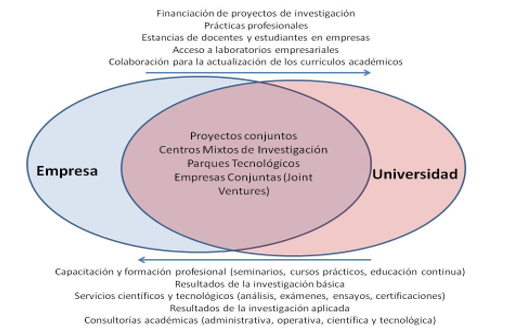
Fig. 1 - Integrative vision of the EU linkage.
Source: (Fernández de Lucio, 2014)
This conception of linking is based on the interactive models of innovation systems, the so-called Mode 2 of knowledge production, the Triple Helix and social networks. (Fernández de Lucio, 2014). Already in the Triple Helix the actor «Government» manifests itself with an important role, but away from total control over the relations between university and business. Following Etzkowitz (2003):
The message of the Triple Helix model is not that universities or governments become companies. Rather, each one assumes some of the other's capabilities; each institution maintains its main role and distinctive identity. (p.18)
The company is conceived as the place of production of goods and services; government as the source of contractual relationships, which guarantee stable relationships and exchanges; and the university as the source of new knowledge and technologies.
The management of the EU relationship has not been free of obstacles and oversizing. What Fernández de Lucio considers myths. (Table 1 )
Table 1 - Myths and realities of the University-Socioeconomic Environment relationship.
Myth1: Contribution of the University to the economic development of the territory through the Transfer of Knowledge: esthetic plans of the Universities |
Realities: Search for excellence through publications: University rankings |
Put the University at the service of traditional SMEs |
Little involvement of "government teams" in relations with the Socioeconomic Environment (ES). |
To improve the norms and processes of the university that facilitate the relationship |
Creation of a foundation or interface external to the University |
Myth 2: The university makes technological innovations: Patents |
Realities: The university innovates in training and in the way of research |
Spin off |
The university innovates in the organization and processes |
Technology marketing |
The foundership |
The model you want to reach |
|
Myth 3: Patents and spin-offs - key instruments for the relationship between science and ES - importance of the economic resources obtained |
Fact: The relationship between science and ES is produced through very varied instruments |
Informal contacts, advice and consulting, research contracted or in collaboration, exchange of personnel, training programs ... |
|
Myth 4: The development of ad-hoc models |
Realities: The bad adaptation of foreign models |
Myth 5: EU Linking in general
|
Realities: Different types of d estuaries and universities |
Companies from different sectors and researchers from different scientific disciplines |
|
Individual characteristics of inventors and entrepreneurs |
|
Myth 6: Instrumental use: new products and solve specific problems |
Realities: Instrumental use: new products and problem solving |
Conceptual use: promotion of reflection, criticism and conceptualization. |
|
Symbolic use: support and legitimization of an idea or position |
|
Myth 7: Facilitate and foster teachers' relationships with the ES |
Realities: |
Perform administrative and economic management |
|
Check compliance with regulations |
Myth1: Contribution of the University to the economic development of the territory by the Transfer of Knowledge: strategic plans of the Universities. Realities: Search for excellence through publications: University rankings.
Put the University at the service of traditional SMEs. Little involvement of "government teams" in relations with the Socioeconomic Environment (ES).
Improve the rules and processes of the university that facilitate the relationship. Creation of a foundation or external interface to the University.
Myth 2: The university makes technological innovations: Patents Realities: The University innovates in training and in the way of research.
Spin-off The University innovates in the organization and processes.
Technology marketing the foundership.
The model you want to reach.
Myth 3: Patents and spin-off key instruments for the relationship between science and the importance of the economic resources obtained. Fact: The relationship between science and ES is produced through very varied instruments
Informal contacts, advice and consulting, research contracted or in collaboration, exchange of personnel, training programs...
Myth 4: The development of ad-hoc models Realities: The poor adaptation of foreign models
Myth 5: EU linkage in a general way Realities: Different types of recipients and universities.
Companies from different sectors and researchers from different scientific disciplines.
Individual characteristics of researchers and entrepreneurs.
Myth 6: Instrumental use: new products and solve specific problems Realities: Instrumental use: new products and solve problems.
Conceptual use: promotion of reflection, criticism and conceptualization.
Symbolic use: support and legitimization of an idea or position.
Myth 7: Facilitate and foster teachers' relationships with the ES Realities:
Perform administrative and economic management.
Control compliance with regulations.
Own elaboration from (Fernández de Lucio, 2014)
The mechanisms, systems and models for the management of the EU relationship are diverse. However, in order for universities to develop cooperation with other agents in a fluid manner and for the institutionalization of relations with companies, relationship management must have elements such as those indicated by Fernández de Lucio, Castro Martinez, Conesa Cegarra, and Gutiérrez Gracia (2000).
The relationship between university institutions and their environment in Ecuador has been called the term "Linkage". Authors such as Saltos Briones, Odriozola Guitart and Ortiz Torres (2018), define it as:
A social process that allows the integration of teaching, research and university extension with the environment: the public, social and productive sectors proactively, for strategic positioning, effective and efficient interaction, of each of its parts. It is based on complex actions that require a structure to achieve innovation, as a result of mutual cooperation and, in turn, achieve economic-social development. (p.129)
From this approach, the university assumes an integrating role of the demands, in this case of the business sector, which assumes a dynamic role through its diverse needs on innovation, human capital formation, advice, etc .; and the government as a regulatory actor from the legal framework and public policies.
The management of the University-Company relationship requires the attention of all levels of the academic and scientific structure of universities; that results in concrete strategies and actions that boost interface activities between both actors of the socio-economic development of the environment. There is no single model or methodology to develop these relationships, but if the management system that is implemented must observe the institutional and contextual characteristics and put away spontaneity and individualization of the actions carried out.
It is defined that the management of the University-Company relationship consists of the set of coordinated actions with the objective of establishing, consolidating and developing systematic links between Higher Education institutions and organizations of the productive sector to obtain mutually advantageous results and developers of the context in which they are performed.
There are contextual conditions in the country, driving this relationship. National policies support a greater relationship of science, technology and society; especially since the approval of the "Organic Code of the Social Economy of Knowledge, Creativity and Innovation" (National Assembly of Ecuador, 2016), known as the Ingenio Law. It regulates and articulates the national system of science, technology, innovation and ancestral knowledge and education and culture systems in the country. It provides the instruments, promotes and encourages the production, circulation and transfer of knowledge between the economic and social sectors.
In recent years there has been a tendency to increase the demand for higher education, generating greater mass access to this educational level, w hich has conditioned the restructuring and rigor of the evaluation and accreditation systems of universities, which must achieve high levels of quality and relevance of their management. Challenges that establish the need for greater links with society and the productive sector that surrounds them. And although the financing to public universities has also evolved positively, however, there are limitations in this aspect, tuition growth, the relevance and impact requirements linked to the growth of private universities; they force the diversification of the financial sources of higher education institutions.
The EU relationship is conceived, not only for the purpose of establishing limited links to innovation and technology transfer, a very common perspective; but with a greater reach towards linking students with the world of work, which brings them closer to their field of work in which they can develop the competencies required by the mode of action of their specialty, among other benefits for their professional training.
The relationship management must be conceived from an integrative and holistic vision between university and company, which limits the linearity of actions in one direction; the adaptation of university processes to business needs; the individualization of teachers' actions; the lack of involvement of authorities in the management and implementation of external models ignoring contextual particularities. Provide this management of collaboration, cooperation, trust, legality and communication; that endow the sustainability process for the quality and relevance of its actions.
For this, the proposed process must have a strategic nature, with objectives and actions that exceed the operability and base its development on institutional norms that regulate and strengthen relationships and their interaction mechanisms. It must achieve a high involvement of authorities, teachers and students, through the implementation of incentives that reward good practices and results. The specialization required by the EU relationship demands the existence of some stable structure that coordinates the implementation of strategies and the execution of actions.
Some issues related to the work and the perception of the teachers of the FACAE on the management of this relationship from their faculty and institution, promoted the analysis that allows having the necessary elements to configure a contribution that favors this process. Issues such as the existence of strategies and structures for the management of the relationship, the assessment of factors on it, the limiting aspects of the links, among others; They are analyzed through the information obtained from teachers. The Table 2 shows the main characteristics of the sample.
Table 2 - General characteristics of the sample.
Age |
Sex |
Years activity |
Academic degree |
Dedication |
Less than 30: 6 (14.6%) |
Woman: 21 (51.2%) |
Less than 5: 9 (22%) |
Doctor: 3 (7.3%) |
Full Time: 35 (85.4%) |
Between 30 and 39: 8 (19.5%) |
Man: 20 (48.8%) |
Between 5 and 9: 12 (29.3%) |
Master's: 32 (78%) |
Part time: 6 (14.6%) |
Between 40 and 49: 18 (43.9%) |
- |
Between 10 and 14: 11 (26.8%) |
Ing./Lic .: 7 (17.1%) |
- |
Between 50 and 59: 8 (19.5%) |
- |
More than 14: 9 (22%) |
- |
- |
More than 59: 1 (2.4%) |
- |
- |
- |
- |
Source: self made
Starting with the importance attributed by the teachers of the FACAE to the EU relationship, in order to process the answers obtained, 2 points were awarded to the High assessments and 1 point to the Average. In the case of Low and None assessments, no score was assigned (Figure 2).
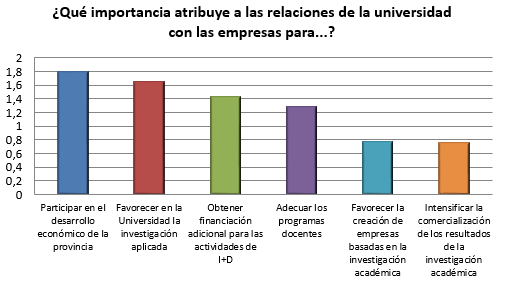
Fig. 2 - Importance attributed to EU relations to perform different actions.
Source: self made.
On the factors of relationship management, it was requested that teachers assess different factors of the management of the EU relationship in the FACAE, from 1 (minimum value), to 5 (maximum value) (Figure 3).
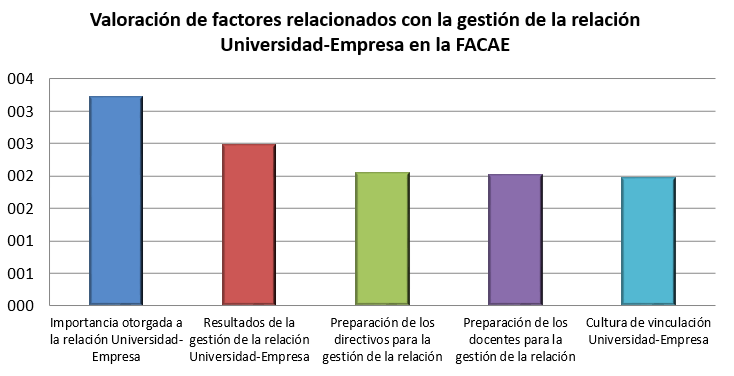
Fig. 3 - Assessment of factors related to the management of the
University-Company relationship in the FACAE.
Source: self made.
To analyze the factors that stop the relationship in the FACAE, 3 points were assigned to the answer Much; 2 points to Pretty and 1 point to Little, whose results are observed. (Figure 4)
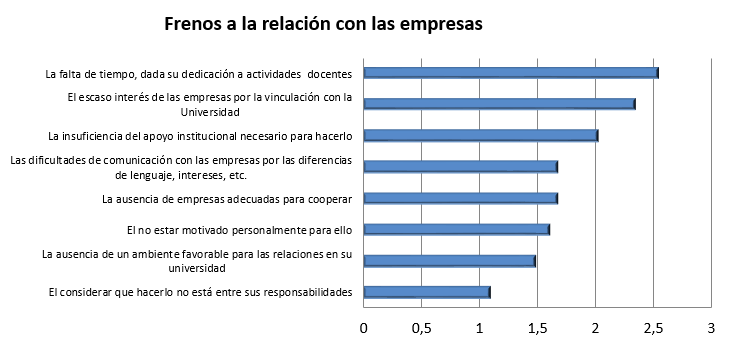
Fig. 4 - Brakes to the relationship with companies.
Source: self made.
When questioning teachers about the barriers that from the company hinder the relationship with the university, a scale of answers from Much (3), Pretty (2), Little (1) and Nothing (0) was used. The results obtained are shown in Figure 5.
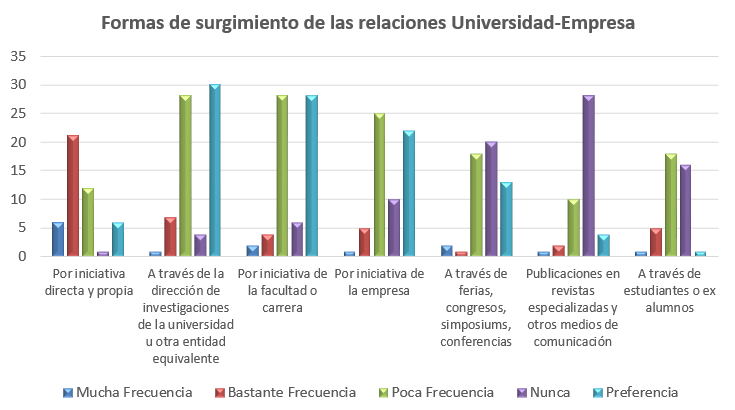
Fig. 5 - Forms of emergence of University-Business relations.
Source: self made.
Other elements investigated were the activities that teachers prefer to carry out relations with the business sector. (Table 3)
Table 3 - Activities preferred by FACAE teachers to establish University-Company relationships.
Preferred activities for the EU relationship |
Answers |
Student internships in companies |
22 |
Training on business demand |
twenty-one |
Research hired |
19 |
Advice and technological support |
17 |
Exchange of research staff |
12 |
Joint investigation |
12 |
Mixed University-Business Centers |
9 |
Informal contacts |
5 |
Patent license |
3 |
TOTAL |
120 |
Source: self made.
The strategic support for this EU relationship management process seems to need attention. When asked about whether UTELVT has defined strategies and actions for the relationship, 35 teachers answered No or I don't know. Figure that amounts to 40 teachers before the same question in the case of the faculty. On the existence of structures for management in the university, 33 teachers respond in a similar way to the previous ones.
Teachers suggest some measures to boost the relationship, as shown in Figure 6.
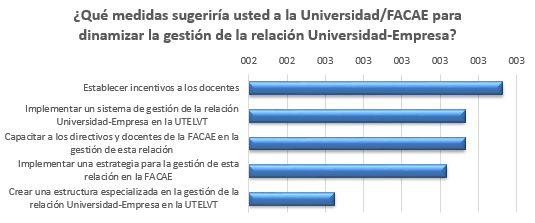
Fig. 6 - Measures to boost the management of the University-Company relationship in
the UTELVT / FACAE.
Source: self made.
The results of the survey carried out already show some important aspects about the current state of relationship management in this faculty.
There is a positive projection towards the practical link with the environment, which produces practical and relevant results, expression of national trends and policies towards the generation and application of knowledge in the context where they should be applied. These results coincide with those of (Vega-Jurado et al., 2007). There is also suspicion towards the commercialization of the results of science, although in general this result is consistent with the perceptions in Ecuador, which enhances innovation and interface mechanisms (National Assembly of Ecuador, 2016), but still its development is incipient.
Although high importance is given to the EU relationship in the FACAE, the low assessment given by teachers to the existence of a culture of EU bonding is a warning, reflecting the lack of systematization of the management of this process in the faculty. This lack is also consistent with the current cooperation of teachers, where more than 80% cooperate little or nothing with companies.
The dedication to teaching tasks is the biggest brake on the relationship between teachers and companies, expressing the inconsistency between the interest of greater impact of university management in their environment and the teaching load of teachers, which generates additional tensions to the latter for the institutionally exerted pressure on their results and scientific production. The low interest of companies in linking is a manifestation of the limited interest of the productive sector of the environment towards R&D activities, a sector mostly dedicated to work that is not very intensive in knowledge and technology. Institutional support for this process is considered as an internal obstacle that does not yet allow us to take advantage of the individual will to boost this relationship.
This last result, agrees with the main forms of emergence of EU relations from the FACAE, where the direct and own initiative is used with a lot and quite often. Very rarely they are carried out through the institutional direction of research, faculty or career and from the business initiative; these routes are indicated by the teachers as the preferred ones to initiate the interaction and that express the desire for a greater institutionalization of this process.
From the cloister it is perceived that the lack of financial resources is the main barrier to the relationship from the companies. Followed by the lack of interest in university research and ignorance of it. Two other barriers valued above two were the reluctance to share information and the difficulties in sharing ownership of the results of the collaboration. So that objective economic factors and associated with the characteristics of emerald companies, basically medium and small, converge; with administrative and subjective factors.
The internship of students in companies is the most preferred activity by teachers in the EU relationship. This result is also similar to that obtained by (Vega-Jurado et al., 2007), and is an activity traditionally accepted and supported by teachers to complement the teaching process in university education. On-demand training, contracted research and technological advice and support are the following activities in preference. The priority is reflected towards activities of less scientific and unidirectional intensity, which provide little scope for a solid integration based on cooperation and exchange. There is also a certain similarity with the results obtained by Medina Elizondo, Gutiérrez González, Molina Morejón, and Barquero Cabrero (2016), in a survey to identify the perception of entrepreneurs in the State of Coahuila in Mexico, about their linking activities and cooperation. In that case, consulting services; courses and seminars and specific training were the preferred modalities for linking with universities.
Institutional strategies are limited and do not generate a favorable and dynamic internal environment for relationships. The results show ignorance among teachers of strategies and structures that support the process of managing the EU relationship; both at the general level in the institution, and at the faculty level. Teachers suggest energizing the management of this relationship mainly through establishing incentives for teachers, and the implementation of a management system in the university for this process, in addition to the training of managers and teachers.
The main regularities extracted from the data obtained are:
1. Weak institutionalization of the EU relationship management process.
2. Spontaneous and atomized nature of interface activities.
3. Absence of strategic strategies or objectives.
4. Limited preparation of teachers and managers.
5. Insufficient structural conditions for management support.
The information obtained empirically and the theoretical bases cited, allow making an initial proposal that contributes to the strengthening of the management of the EU relationship in the FACAE, strategic objective to be achieved. The proposed process is aimed at implementing a new way of managing the relationship in the faculty and transforming the existing situation through principles, stages and a systemic approach; that contribute to achieve the desired situation and move towards a strategic, sustainable, dynamic and high integration relationship.
First, a set of premises to be observed in management are defined:
This management must also be developed from a systemic approach. An open system that receives inputs from the environment and provides transforming outputs from it. The main expected inputs and outputs of the EU relationship management process (Table 4):
Table 4 - Main Inputs and Outputs of a University-Company relationship management system.
Tickets |
Departures |
Demands of local and national development processes. |
Optimization of the quality of university graduates. |
Career study plans. |
Greater impact on local and national development. |
Needs and problems of the business sector. |
Dynamization of innovation processes and technology transfer. |
National development policies and strategies. |
Availability of new sources of financing. |
Needs derived from the substantive university processes. |
Growth of business competitiveness. |
Economic and business trends of the environment. |
Strengthening of university relevance. |
The process to follow must contain at least the following stages:
1. Diagnosis of the management of the EU relationship in the FACAE: At this stage, techniques and means should be used to allow the collection, processing, analysis and dissemination of information to make consistent decisions in relationship management. Identify the regularities of this process in the faculty, determine the factors that limit relations with the business sector and determine the specific needs of university processes towards linking. Also analyze trends in the economic-business context, which generate opportunities and threats for the relationship. Identify, at a local and national level, the problems and demands that offer the greatest possibilities for the relationship and integration between companies and faculty.
2. Formulate the integrating objectives of the management of the EU relationship: Based on the results of the previous stage, the objectives to be achieved by the management of the process in the FACAE are formulated. These should be directed towards internal and external management. The information obtained in the diagnosis, the criteria of career coordinators are two basic pillars in the formulation; which should also include the possibility of providing participation to the staff of the local business and government sector.
3. Design of strategies or strategic actions: Strategies must observe the diversity of business sectors in the environment and their particularities; the dimensions of the companies and their characteristics. Define concrete strategic actions for each objective, the activities and tasks to be carried out, the necessary resources and their sources.
4. Projection of interface activities: Through these activities the mechanisms of interaction between faculty and companies are specified. Important components of this projection are the communication between both actors of the relationship, which generates the necessary confidence to define their needs and interests. Define the legal mechanisms that support the relationship, its objectives and obligations of the participants. The interface activities should be directed towards achieving a level of integration between the university and the business entity, focusing on the needs in each one; facilitate the obtaining and transfer of value results, minimize differences between universities and companies and strengthen the creation of strategic alliances.
5. Organization: Establish coordination mechanisms within the careers and among them to carry out interface actions and activities. Decide if it is necessary to create a specialized structure in relationship management that systematizes and coordinates strategies and actions.
6. Execution: A stage where cooperation between academic areas, involvement of the senior management of the faculty and communication with the business side is essential. A key factor is the existence of scientific leaders, who motivate and encourage teachers and researchers towards relationships with the company.
7. Control and Evaluation: Although HEIs implement forms of control that to some extent involve external entities; control of the EU relationship must be characterized primarily by the committed and active participation of company officials with whom they maintain relationships.
The Figure 7 shows the proposed process.
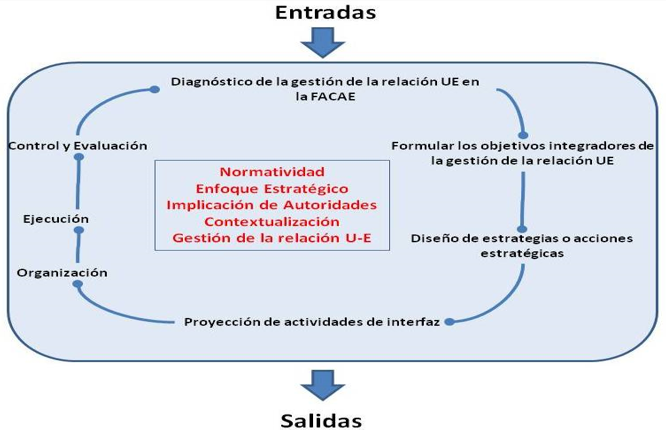
Fig. 7 - Management process of the University-Company relationship in the FACAE.
Source: self made.
DISCUSSION
The EU relationship developed by the FACAE, lacked a conscious and specialized management, dominating spontaneity and actions poorly linked to university processes. The positive assessment between its teaching and management staff towards this relationship does not translate into relevant activities and projects; due to limitations of time, knowledge and conditions to achieve strategic and advantageous links.
The proposed process, consistent with the pedagogical conception of national higher education and in the UTELVT, contributes to the greater institutionalization of the EU relationship, through mechanisms, practices and cultural transformation; that direct their management towards systematization and the specific objectives that contribute to university quality. The prevalence of spontaneity and the atomization of actions are reduced, which will allow the process to have greater possibilities of impact, from a strategic approach that enhances the relevance of the EU relationship and, in this way, of substantive processes.
The basic structural conditions are established to support the management process, an element that provides the basic tools to allow a more stable, organized and sustainable work with the Emeraldas business sector. The process promotes an effective communication framework between faculty and companies, to boost their relationships. It must be continually perfected and adapted to the characteristics and contextual needs, and of the business entities and the university.
A university that seeks to achieve high levels of quality must attend and prioritize relations with its environment. Failure to do so implies putting your own existence as an institution at risk. The EU relationship provides relevance to the substantive university teaching, research and linking processes; a way to raise the transformative impact of the environment and relevance to university results.
BIBLIOGRAPHIC REFERENCES
Asamblea Nacional del Ecuador. Código orgánico de la economía social de los conocimientos, creatividad e innovación, IV Registro Oficial § (2016). Recuperado de http://www.wipo.int/edocs/lexdocs/laws/es/ec/ec075es.pdf
Castro-Martínez, E., Olmos-Peñuela, J., y Fernandez-de-Lucio, I. (2016). La Vinculación Ciencia-Sociedad: Estereotipos y Nuevos Enfoques. Journal of Technology Management y Innovation, 11(2), 121129. https://doi.org/10.4067/S0718-27242016000200012
Chen-Quesada, E., y Segura-Bonilla, O. (2018). La educación ante las nuevas demandas del sector empresarial y el desarrollo nacional. EnLa vinculación Universidad-Empresa para el desarrollo integral con impacto social (pp. 1128). Ciudad de México: REDUE-ALCUE/UDUAL. Recuperado de http://redue-alcue.org/website/content/publicaciones/vueimpactosocial/Cap-01%0A
CRESALC/UNESCO. (2018). Declaración-CRES 2018. Córdoba. Recuperado de http://www.cres2018.org/uploads/Declaracion2018-Esp-CRES.pdf
CRESALC. (1996). Informe del Director de CRESALC. En CRESALC (Ed.), Conferencia Regional sobre Políticas y Estrategias para la Transformación de la Educación Superior en América Latina y el Caribe. Caracas: CRESALC. Recuperado de https://unesdoc.unesco.org/ark:/48223/pf0000149330
Etzkowitz, H. (2003). Innovation in innovation: The Triple Helix of university-industry-government relations. Social Science Information, 42(3), 293337. https://doi.org/10.1177/05390184030423002
Etzkowitz, H., y Leydesdorff, L. (2000). The dynamics of innovation: from National Systems and `«Mode 2»' to a Triple Helix of universityindustrygovernment relations, 29, 109123. https://doi.org/10.1016/S0048-7333(99)00055-4
Fernández de Lucio, I. (2014). Mitos y realidades de la vinculación Universidad-Entorno Socioeconómico. EnCongreso Red ALCUE (p. 25). Buenos Aires: Ingenio-UPV.
Fernández de Lucio, I., Castro Martínez, E., Conesa Cegarra, F., y Gutierrez Gracia, A. (2000). Las Relaciones Universidad-Empresas: Entre la Transferencia de Resultados y el Aprendizaje Regional. Espacios, 21(2), 118. Recuperado de https://www.researchgate.net/publication/27294430_Las_Relaciones_Universidad -Empresas_Entre_la_Transferencia_de_Resultados_y_el_Aprendizaje_Regional
Gibbons, M., Limoges, C., Nowotny, H., Schartzman, S., Trow, M., y Scott, P. (1994). The new production of knowledge: the dynamics of science and research in contemporary societies. (SAGE, Ed.). London: SAGE.
Leydesdorff, L., y Meyer, M. (2006). Triple Helix indicators of knowled- ge-based innovation systems: Introduction to the special issue. Research Policy, 35(10), 1441-1449. http://dx.doi.org/10.1016/j.respol.2006.09.016
Martínez Gil, L. (2014). Alcune sfide nella gestione del rapporto Università-Impresa a Cuba. Ricerche Di Pedagogia e Didattica. Journal of Theories and Research in Education, 9(2), 93110. https://doi.org/10.6092/issn.1970-2221/4365
Medina Elizondo, M., Gutierrez González, L., Molina Morejón, V. M., y Barquero Cabrero, J. D. (2016). Sistema de vinculación Universidad-Empresa: validación de su impacto económico y social. Revista Internacional, Administración y Finanzas, 9(1), 81-93.
OCDE. (1996). The Knowledge-based Economy. (OCDE, Ed.). Paris: OCDE.
Quispe Peña, E. C., Poma Gutierrez, A. G., y Quispe Bonilla, M. D. (2018). Vínculo universidad- empresa-estado y transferencia tecnológica: creación del Fiber-Den y Minifiber para evaluación de fibras de animales. EnLa vinculación Universidad-Empresa para el desarrollo integral con impacto social (pp. 399414). Ciudad de México: Red Universidad-Empresa América Latina y El Caribe-Unión Europea (ALCUE);Unión de Universidades de América Latina y el Caribe. Recuperado de http://redue-alcue.org/website/content/publicaciones/vueimpactosocial/Cap-22
Rinesi, E. (2018). La producción de conocimiento y el desarrollo. Consecuencias del postulado de la universidad como derecho. En P. H. Guajardo (Ed.), La investigación científica y tecnológica y la innovación como motores del desarrollo humano, social y económico para América Latina y el Caribe (pp. 5774). Córdoba: UNESCO/IESALC. Recuperado de http://www.iesalc.unesco.org.ve/
Saltos Briones, G., Odriozola Guitart, S., y Ortiz Torres, M. (2018). La Vinculación Universidad-Empresa-Gobierno: Una Visión Histórica y Conceptual. Ensayo. Edición Continua, 9, 121139.
UNESCO. (2005). Hacia las sociedades del conocimiento. (Ediciones UNESCO, Ed.). Paris: Ediciones UNESCO.
Vega-Jurado, J., Fernández-De-Lucio, I., y Huanca-López, R. (2007). ¿La Relación Universidad-Empresa En América Latina: Apropiación Incorrecta De Modelos Foráneos? J. Technol. Manag. Innov, 2(2).
![]()
This work is licensed under a Creative Commons Attribution-NonCommercial 4.0 International License
Copyright (c) Lisbet Martínez Gil, Romina Tanagra Oyarvide Ibarra, Félix Segundo Rosales
Cortés, Mercedes Magdalena Bustos
Gámez